
Sociology Lens
Scope & Guideline
Illuminating the complexities of society with innovative research.
Introduction
Aims and Scopes
- Interdisciplinary Sociological Research:
The journal emphasizes the importance of interdisciplinary approaches, integrating sociology with history, politics, and cultural studies to examine social phenomena. - Historical Contextualization:
A consistent aim is to historicize social issues, exploring how past events shape current societal structures and identities. - Global Perspectives on Local Issues:
The journal frequently examines local issues through a global lens, highlighting transnational connections and the impact of globalization on local communities. - Critical Analysis of Power and Ideology:
A core area of focus is the critical examination of power dynamics, ideology, and their effects on various social groups, particularly marginalized communities. - Media and Representation:
The journal investigates the role of media in shaping social narratives and identities, exploring how representation influences public discourse.
Trending and Emerging
- Transnational Identities and Migration:
There is a growing focus on the experiences of transnational communities, particularly in relation to migration, identity formation, and the impact of geopolitical changes. - Media Representation and Critical Discourse:
Recent articles emphasize the critical analysis of media representations, particularly concerning marginalized communities and current events, revealing the journal's commitment to understanding the role of media in social contexts. - Environmental Sociology and Climate Change:
Emerging themes include the sociological implications of climate change and environmental degradation, reflecting an increased awareness of ecological issues and their social ramifications. - Childhood Studies and Youth Culture:
The journal is increasingly publishing works related to childhood studies, exploring how contemporary socio-political dynamics affect youth cultures and experiences. - Decolonization and Knowledge Production:
There is an emerging trend towards decolonizing sociological thought, with a focus on understanding the implications of Western knowledge systems on non-Western societies and identities.
Declining or Waning
- Traditional Sociological Theory:
There seems to be a reduction in papers solely focused on classical sociological theories, as the journal shifts towards applying these theories in contemporary contexts rather than discussing them in isolation. - Local vs. Global Dichotomy:
The once prominent discussions contrasting local and global sociological issues appear to be waning, with a growing emphasis on integrated perspectives that blend both. - Nostalgic Historical Analyses:
There is a noticeable decrease in the nostalgic analysis of historical events without a critical lens, as the journal increasingly favors research that connects history to current social issues.
Similar Journals

World Literature Studies
Elevating Voices in the Realm of Literary TheoryWorld Literature Studies is a leading academic journal published by the Institute of World Literature at the Slovak Academy of Sciences, dedicated to advancing the field of literary studies. With an ISSN of 1337-9275 and an E-ISSN of 1337-9690, this journal has established itself as a prominent platform for scholarly research and discourse, earning a prestigious Q1 ranking in the Literature and Literary Theory category as of 2023, placing it in the top 25% of journals in its field according to Scopus metrics. Operating from Slovakia, the journal caters to a global audience, highlighting diverse perspectives in world literature and fostering interdisciplinary collaboration. Though it currently offers no Open Access option, it maintains a rigorous peer-review process that ensures the quality and integrity of published works. Researchers, students, and literary professionals alike will find the journal's comprehensive articles and critical analyses essential for staying informed about the latest developments and trends in literature and literary theory.

Digithum
Fostering Insightful Connections in a Digital Age.Digithum is an esteemed open access journal published by Universitat Oberta de Catalunya since 1999, dedicated to fostering interdisciplinary discourse within the realms of Arts and Humanities as well as Social Sciences. With an ISSN of 1575-2275, this journal provides a platform that bridges academic inquiry and contemporary societal issues, earning recognition with a Q3 ranking in Arts and Humanities and a Q4 ranking in Social Sciences as of 2023. Based in Barcelona, Spain, Digithum is indexed in key databases and holds a prestigious position in Scopus rankings, particularly noted for its impact in the arts and humanities with a 76th percentile standing. The journal promotes unrestricted access to its articles, ensuring that valuable research reaches a broad audience, thus empowering scholars, practitioners, and students to engage deeply with the challenges and narratives of our time. With the evolving landscape of academic research, Digithum remains a vital resource for those seeking to explore the intersections of culture, technology, and society.

Filosofija-Sociologija
Advancing Knowledge at the Crossroads of Philosophy and SociologyFilosofija-Sociologija, a distinguished journal published by the Lithuanian Academy of Sciences, serves as a vital platform for scholarly discourse in the interdisciplinary fields of philosophy, sociology, and political science. With an ISSN of 0235-7186, this journal has solidified its reputation, ranked in the Q2 category for Philosophy and Q3 for Sociology and Political Science as of 2023, reflecting its growing influence within academia. Its Scopus rankings further substantiate its impact, especially in Arts and Humanities and Social Sciences. Covering an expansive scope from 2008 to 2024, Filosofija-Sociologija is dedicated to publishing innovative research that challenges conventional thought and fosters academic inquiry. Although currently operating without open access options, the journal remains an essential resource for researchers and professionals keen on exploring the dynamic intersections of philosophical thought and sociological analysis in the context of Lithuania and beyond.
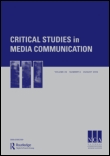
CRITICAL STUDIES IN MEDIA COMMUNICATION
Innovating Perspectives on Media InteractionsCRITICAL STUDIES IN MEDIA COMMUNICATION, published by Routledge Journals, Taylor & Francis Ltd, stands as an influential platform for discourse in the field of communication studies. With an ISSN of 1529-5036 and an E-ISSN of 1479-5809, the journal provides an invaluable resource for researchers, professionals, and students exploring the complexities of media interactions and their socio-cultural implications. The journal has established a solid reputation, evidenced by its categorization as Q2 in Communication for 2023 and its impressive Scopus ranking of #189 out of 511 within the Social Sciences _ Communication category, placing it in the 63rd percentile. Operating out of the United Kingdom, CRITICAL STUDIES IN MEDIA COMMUNICATION encompasses a scope that debates critical theory versus applied media research, fostering interdisciplinary dialogue that addresses emerging trends and critical issues within the media landscape. With a commitment to open access and forward-thinking scholarship, this journal not only enhances academic understanding but also actively shapes practices within the communication field as it continues through its converged years from 1996 to 2024.
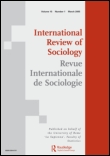
International Review of Sociology-Revue Internationale de Sociologie
Connecting researchers and practitioners worldwide.International Review of Sociology-Revue Internationale de Sociologie is a distinguished academic journal published by Routledge Journals, Taylor & Francis Ltd, focusing on the critical exploration of sociological and political science theories and practices. Since its inception, the journal has continually evolved, with publications dating back to 1987, and it remains a prominent reference point within its field, currently ranking in the Q2 category for Sociology and Political Science in 2023. With an impressive Scopus rank of #430 out of 1466, it places the journal in the 70th percentile among social sciences journals, reflecting its influence and significance in advancing sociological discourse. The International Review of Sociology serves as a platform for researchers, practitioners, and students eager to engage with contemporary issues, fostering a rich exchange of ideas that spans across cultural, political, and social dimensions. While it does not currently offer open access, its rigorous peer-review process ensures the publication of high-quality research essential for both academic and professional audiences.

AMERICAN SOCIOLOGIST
Exploring the Dynamics of Society and ThoughtAMERICAN SOCIOLOGIST is a prominent academic journal published by SPRINGER, representing a vital resource in the fields of sociology and political science. With an ISSN of 0003-1232 and an E-ISSN of 1936-4784, this journal has contributed significantly to the sociological literature since its inception, offering insights that challenge conventional thought and stimulate critical discussion. The journal has maintained its relevance throughout various converged years, ensuring a comprehensive exploration of sociological topics from 1973 to 2024. Currently, it holds a commendable status in the second quartile (Q2) within both Social Sciences (miscellaneous) and Sociology and Political Science categories, reflecting its robust impact and academic influence, with Scopus ranks placing it in the 52nd percentile across its fields. Though it operates under a subscription model, the journal provides crucial access for researchers, professionals, and students keen on uncovering contemporary issues and advancements in sociology. With its dedication to fostering an understanding of complex societal dynamics, AMERICAN SOCIOLOGIST is an essential platform for disseminating pioneering research and innovative ideas that shape our understanding of social phenomena.
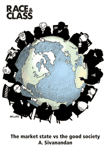
RACE & CLASS
Illuminating the Ties Between Culture and HierarchyRACE & CLASS, a prestigious journal published by SAGE Publications Ltd, focuses on advancing scholarship in the fields of Anthropology, Archaeology, Cultural Studies, and Sociology. Since its inception in 1959, it has become an indispensable resource for researchers and professionals interested in examining the intersections of race, class, and power dynamics within various sociocultural contexts. With an impressive standing in the academic community, it holds a Q1 status in multiple categories, placing it within the top quartile of journals for both Social Sciences and Humanities disciplines, thus ensuring high visibility and citation impact. Although it is not open access, the journal continues to provide rich, peer-reviewed content that invites informed discourse and critical analysis. With its dedication to addressing contemporary issues of inequality and social justice, RACE & CLASS remains a cornerstone for scholars and students alike, fostering a deeper understanding of complex societal structures.
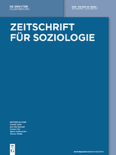
ZEITSCHRIFT FUR SOZIOLOGIE
Advancing Sociological Insights for a Complex WorldZEITSCHRIFT FUR SOZIOLOGIE is a distinguished journal in the field of sociology, published by WALTER DE GRUYTER GMBH, a renowned academic publisher based in Germany. Since its inception in 1972, the journal has consistently contributed to the advancement of sociological knowledge, bridging theoretical frameworks and empirical research. With an impact factor reflecting its relevance in the academic community, it has achieved a commendable ranking of Q3 in the Sociology and Political Science category as of 2023. Its Scopus ranking positions it among the top half in its field, with a notable percentile of 49th. Although it does not offer open access, the journal remains a vital resource for researchers, professionals, and students seeking to explore contemporary sociological issues and critical analyses. Its comprehensive scope includes topics that address the complexities of social relationships and institutions, making it a pivotal publication for those committed to understanding the dynamics of society.
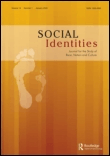
Social Identities
Advancing Multidisciplinary Insights into Identity FormationSocial Identities is a distinguished academic journal published by Routledge Journals, Taylor & Francis Ltd, dedicated to advancing the understanding of social identities from a multidisciplinary perspective. With an ISSN of 1350-4630 and an E-ISSN of 1363-0296, this journal stands out in the sociology and political science disciplines, as evidenced by its impressive Q2 ranking and a Scopus percentile of 64th. Spanning from 1995 to 2024, it continually fosters scholarly discourse on the complexities of identity formation, representation, and the interplay between various social dynamics. Although the journal currently does not offer Open Access options, it remains a valuable resource for researchers and professionals seeking in-depth analysis and critical insights. Based in the United Kingdom, Social Identities is a vital platform for both emerging scholars and established experts dedicated to exploring the nuances of how identities shape social structures and experiences.

SOCIAL RESEARCH
Championing scholarly excellence in cultural and historical studies.SOCIAL RESEARCH, published by Johns Hopkins University Press, is a distinguished journal that has been integral to the discourse in the social sciences since its inception in 1946. With an ISSN of 0037-783X, this journal encapsulates a diverse range of scholarly articles and research findings, making significant contributions to fields such as Cultural Studies, History, Philosophy, Political Science, and Sociology. Its impressive impact factor showcases its credibility and relevance, while its current category rankings highlight its strong positioning, particularly as a Q1 journal in History and Q2 in Cultural Studies. Although not an Open Access publication, readers can access a wealth of knowledge that spans across pivotal years and topics, encouraging a deeper understanding and critical engagement with contemporary social issues. By bridging theoretical and empirical research, SOCIAL RESEARCH remains an essential resource for researchers, professionals, and students striving to advance their knowledge and impact within the social sciences.